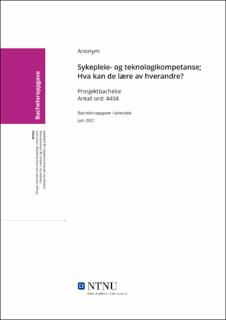| dc.contributor.advisor | Andre, Beate | |
| dc.contributor.author | Pukstad, Ingeborg | |
| dc.date.accessioned | 2021-09-25T16:23:04Z | |
| dc.date.available | 2021-09-25T16:23:04Z | |
| dc.date.issued | 2021 | |
| dc.identifier | no.ntnu:inspera:81643445:34520485 | |
| dc.identifier.uri | https://hdl.handle.net/11250/2782888 | |
| dc.description.abstract | Bakgrunn: Samfunnsendringer fører til økende eldre befolkning og mangel på helsepersonell i fremtiden. Disse utfordringene innen helsetjenesten kan teknologi bidra til å løse. Med den teknologiske utviklingen forventes det at sykepleiere har kompetanse på stadig mer avansert teknisk utstyr, og stadig flere ingeniører vil bli ansatt i helsetjenesten. Det er viktig at sykepleiekompetanse påvirker bruk av medisinsk teknisk utstyr, men det er omdiskutert i hvor stor grad sykepleiere skal bruke teknologi i sin arbeidshverdag. I denne studien spør vi følgende: Hvorfor må de som jobber med medisinsk teknologi ha sykepleiekompetanse og skal sykepleiere ha kompetanse på bruk av teknologi?
Metode: I dette prosjektet ble det brukt kvalitativ metode for å finne svar på problemstillingen. Det ble gjennomført fire semistrukturerte individuelle intervju. Alle informantene var anestesi- eller operasjonssykepleiere, og jobbet dermed med medisinsk teknologi. Dataene fra intervjuene ble strukturert og analysert ved tematisering.
Resultat: Informantene fortalte hvordan de brukte sin sykepleiekompetanse i sitt arbeid med medisinsk teknologi, og at denne kompetansen var av stor betydning. De la vekt på at de brukte sin kliniske kunnskap, naturvitenskapelig kunnskap, sin evne til empati og evne til å ta vare på en pasient. Det var en positiv holdning til den teknologiske utviklingen. Informantene var tydelige på at sykepleiere bør ha kompetanse på å bruke teknisk utstyr fordi det er en del av behandlingen til pasientene. De hadde også sterke meninger om å kunne det tekniske utstyret godt nok, slik at man kan fokusere på å ta vare på pasientene, som forventer at man kan det. Det ble fortalt at man har noe egenansvar for å tilegne seg den nødvendige kunnskapen. Informantene prioriterte høyt å gi nok omsorg til pasientene tross mye mulig distraherende teknologi, spesielt når man er uerfaren. De kunne nevne flere tiltak de gjorde for å sikre dette i sin arbeidshverdag. Likevel ble det nevnt at det kan være vanskelig å ta vare på pasienten i en akutt situasjon.
Konklusjon: Sykepleiekompetanse må ha en innvirkning på bruk av teknologi innen helse, ifølge både informantene i denne studien og ifølge tidligere forskning. Da spesielt evnen til å se de kliniske observasjonene i sammenheng med data fra teknologi. Informantene fortalte at sykepleiere må ha kompetanse på bruk av medisinsk teknisk utstyr, hovedsakelig på bakgrunn av at det er til det beste for pasienten. Videre sa de at sykepleiere må kunne det tekniske utstyret så godt at de klarer å samtidig vise omsorg for pasienten. Informantene hadde et inntrykk av at sykepleiere klarer å ivareta pasientene på tross av store mengder teknisk utstyr. | |
| dc.description.abstract | Background: Changes in society causes the elder population to grow and a shortage of health- care workers. Technology can contribute to solving these challenges in the healthcare service. As healthcare becomes more digitalised, nurses are expected to know how to use more advanced technical equipment, and more engineers will be working in the healthcare service. When using medical technology, a certain competence in nursing is required, but to what degree nurses should use technology in their work is up for discussion. In this study we ask the following question: why must the ones who work with medical technology have competence in nursing and should nurses have competence in how to use technology?
Method: This project used a qualitative approach when addressing the main issue. Four semi structured individual interviews were done. All the participants were nurses with a specialisation in anaesthetics or surgery, and hence they worked with medicinal technology. The data was structured and analyzed by thematizing.
Results: The participants told about how they used their competence on nursing in their work with technology, and that this competence was of great significance. They emphasised their clinical knowledge, their scientific knowledge, their ability for empathy and their ability to take care of patients. There was a positive attitude towards the digital shift. The participants bastard that nurses should have competence on using technology, because it is part of the patient’s treatment. Furthermore, they found it very important that the competence on using technical equipment is high enough, so that they can rather focus on the patient, who expects that you know how to use the equipment. They also said that nurses are partly responsible themselves for obtaining the required knowledge. The participants prioritised greatly to care for the patient despite that the technical equipment can be distracting, especially if you are new to it. They took action to assure this in their work through various methods. Nevertheless, they had to admit that taking care of the patient can be difficult in acute situations.
Conclusion: Competence from nursing must have an impact on using medical technological equipment. Particularly the ability to understand data from technology in a context of clinical observations. The participants stated that nurses must have competence on using technical equipment, mainly due to it being in the patient’s best interest. The competence should also be on such a level that the nurses are capable of simultaneously taking care of the patient. The participants had the impression that they managed to take care of the patient despite a large amount of technical equipment. | |
| dc.language | nob | |
| dc.publisher | NTNU | |
| dc.title | Sykepleie- og teknologikompetanse; Hva kan de lære av hverandre? | |
| dc.type | Bachelor thesis | |
